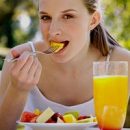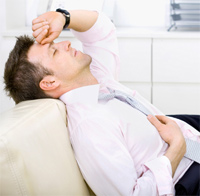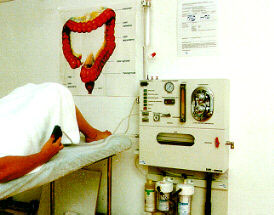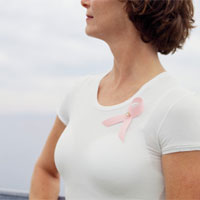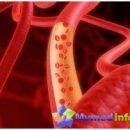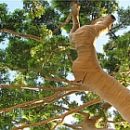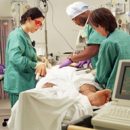One of the main methods for the prevention of esophageal cancer is the right nutrition. Worldwide, scientists do not stop research, trying to find out what products are good, and what is bad for the esophagus. The results of these studies - in our article.
Content
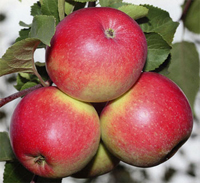 French scientists wondered why in Normandy is more often sick of esophagus cancer than in Burgundy or in the middle pyrenees. In Normandy, the production of milk and the cultivation of apples is widely developed, while other regions more correspond to the French cultural and agricultural tradition. Based on this, French scientists have established the following: the main risk factors were excessive consumption of butter and disadvantage in the diet of cooked fresh fish, vegetables and fruits. Moreover, residents of Normandy in large quantities drink their favorite alcoholic drink Calvados (derived from apple cider), and with his hot. Scientists have concluded that excessive cream oil consumption and habit of drinking hot alcoholic beverages are potential risk factors that contribute to the esophagus cancer.
French scientists wondered why in Normandy is more often sick of esophagus cancer than in Burgundy or in the middle pyrenees. In Normandy, the production of milk and the cultivation of apples is widely developed, while other regions more correspond to the French cultural and agricultural tradition. Based on this, French scientists have established the following: the main risk factors were excessive consumption of butter and disadvantage in the diet of cooked fresh fish, vegetables and fruits. Moreover, residents of Normandy in large quantities drink their favorite alcoholic drink Calvados (derived from apple cider), and with his hot. Scientists have concluded that excessive cream oil consumption and habit of drinking hot alcoholic beverages are potential risk factors that contribute to the esophagus cancer.Japanese men living in Hawaii were also examined. The probability of the occurrence of esophageal cancer significantly increased with the increase in their share of rice, algae and tofu in their diet. The high level of consumption of beer, wines, strong alcoholic and alcoholic beverages in general, as a rule, significantly increases the risk of disease. Smokers (compared to non-smoking) sick esophageal cancer three times more. On the other hand, consumption of a large amount of fruit effectively protects against this type of cancer.
In South America, studies were conducted in the regions with a high level of morbidity. Guess what caused esophagus cancer? Very hot drinks! In particular, the local traditional drink is a kind of herbal tea called «Mate». Mate is doubly dangerous. Even cold, it contributes to the occurrence of esophageal cancer (the reason is unknown). But if you drink it hot, the risk of sick of the esophagus cancer increases five times. At the same time, ordinary tea at normal temperature protects against this disease, but it becomes dangerous if drinking it burning hot. Other risk factors include excessive consumption of meat, salts and animal fats. At the same time, the daily inclusion in the diet of a large number of fruits and vegetables protects from esophageal cancer. This is evidenced by a study conducted in Uruguay.
Italian scientists also found that butter and hot soup increases the likelihood of esophageal cancer, while raw vegetables and citrus resist this risk. Another Italian study showed that the admission to the body of nitrosamines and mycotoxins is a risk factor.
Swedish scientists have found that consumption of less than three portions of vegetables and fruits per day is a serious risk factor. They also studied gastrooform reflux as a possible risk factor that promotes the development of esophagus cancer. And at present, no connection was found (surprising!).
A study conducted among the British women (whose sausage cancer is three times more often than from other Europe), gave the following interesting result; The probability of getting much higher in full women and those who eat little fruit. Preventive measure is breastfeeding children. In another study, it is shown that lovers of very hot tea and smokers are more risky to get sick with esophagus cancer, and lovers of vegetable salads - less.
Chinese scientists conducted a study in Hong Kong and found that hot drinks and soups, pickled vegetables, disadvantage in the diet of fruits and green leafy vegetables, alcohol smoking and alcohol abuse increase the probability of the disease. A study conducted in the city of Jizzyan (China) showed that too hot tea is also promoted, food in a hurry, meat consumption and animal fat.
In South Africa, they checked some traditional products suspected of the fact that they enhance the exposure of esophagus cancer. Scientists have established that the cause is black toasts (usually considered to be poisonous, but in some regions, after full ripening, fruits and leaves are prepared and eaten), beans and pumpkin (they all contain «Inhibitors protease», anticatious substances). Another factor is tobacco smoking.
Many patients with esophageal cancer eat normally interferes with the very disease, preventing the process that benefits - proper nutrition. Such patients have to be fed through the tube, sucked in the stomach; This technique is called «Enteral nutrition». Fortunately, it was found that this method of nutrition is no different from the usual, provided that all components of the diet are in the ideal ratio. In reality, many patients with esophageal cancer suffer from malnutrition due to the fact that it is difficult for them to eat in the usual way. It is necessary to make special efforts to provide a patient with good nutrition, even if you have to enter nutrients intravenously; Such food is called parenteral.
Studies conducted by the case-control method showed that it is useful to consume certain nutrients in large quantities that are present in plant food - soluble tissue, beta-carotene, folate (Vitamin B, also known as pholacine and folic acid; Synthesis of genetic cell material and for the formation of red blood cells) vitamins C and B6. Food cholesterol, food fats, animal proteins and vitamin B12 increase the likelihood of disease. In the course of another study, it was established that linoleic acid (Omega-6 class oil) turns into prostaglandin E2, which in turn «violates the normal level of pH and the content of fluid in the esophagus, thereby contributing to the development of cancer». No matter how surprisingly, this phenomenon is characteristic of a diet based on corn (which contains many linoleic acid).
Spanish scientists confirmed that smoking and alcohol abuse are serious risk factors.
Studies conducted in India confirmed that the development of the disease promotes the lack of zinc and folate organism (it can be filled with vegetable food).
Japanese scientists have demonstrated the importance of such a trace element as molybdenum, for the prevention of esophageal cancer. It takes only a few micrograms, and he is in abundance present in a wide variety of products, especially in nuts. The lack of molybdenum is extremely rare even in those who eat as the middle American.
Studies of American scientists have shown that high-calorie food with high fat, calcium and vitamin A, beer, meat increases the likelihood of esophageal cancer, and the diet rich in fruit and vegetables, this risk reduces.
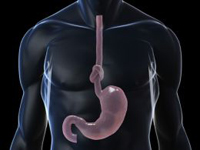 And now a few tips on the organization of food before and after the treatment of the cancer tumor of the esophagus.
And now a few tips on the organization of food before and after the treatment of the cancer tumor of the esophagus.
While you expect treatment, you need to try to maintain a good level of food, if necessary, using nutritional supplements. Find the opportunity during diagnostics or after a surgical operation to visit the nutritionist to obtain recommendations. If you find that you cannot swallow food at all, you should immediately report this to the doctor.
If you have transferred a surgical operation and it turned out that when the operation did not need to remove a large part of your stomach, then you can have everything you want, as soon as your doctor says that you can start to start. Well, if you quickly start eating hard food, provided that it will not be big pieces and you will chew it. This will create a natural load on the seam and will help save the clearance open during healing. Initially, you can feel the fear of taking hard food, but this fear will decrease as soon as you get used to normal nutrition. When you eat, acids come in the stomach to help digest food, and it can cause an unpleasant heartburn due to the new position of your stomach. You may also find that you are much faster than satisfying because your stomach has decreased if part of it has been removed. To prevent these problems, it is better to eat and often, and not try to absorb big meals. Also reasonably slowly. You may need from time to time to exclude some foods, such as fruits, vegetables and cereals to cope with diarrhea attacks that quite often occur after surgery.
If you transferred radiation therapy or you have a tube, then you probably need a softer diet. Avoid food that can cause a blockage of a tube or because of which you may have difficulties with swallowing, such as raw fruits and vegetables, hard meat, stale bread. Any powdered nutritional supplements should be very thoroughly mixed. Also well, if you are slow and enough to drink enough during and after eating. If you begin to experience difficulties with swallowing food, perhaps your tube plugged. Then consult a doctor to get recommendations.

